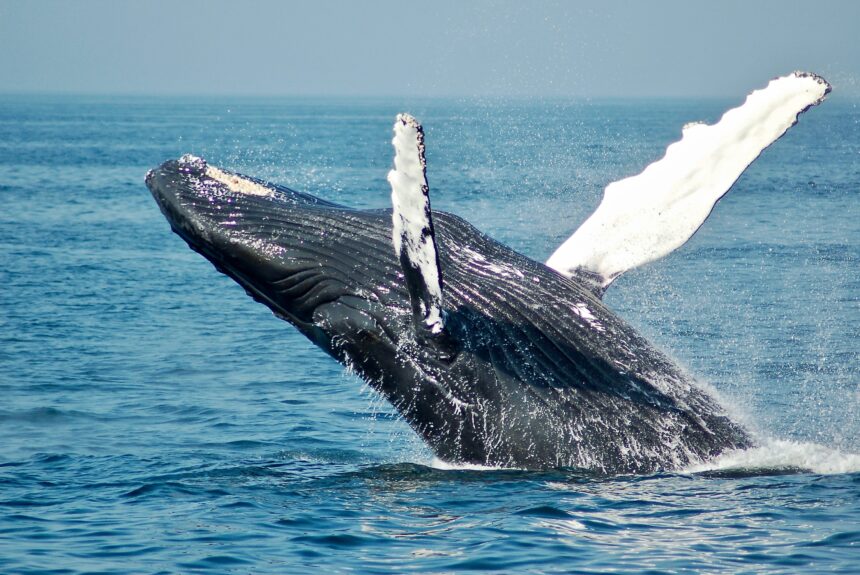Ship strikes are a significant threat to whales. Annual estimates for whales killed by ships have been listed as high as 20,000 animals. These collisions kill 20 times more whales every year than whaling does. Ship strikes are a serious problem, but new and innovative technology may make them a problem of the past.
It is estimated that 80 whales are killed every year in ship strikes off the West Coast in the Pacific, so it is fitting that Whale Safe is being developed in California. Whale Safe, developed by The Marine Mammal Center and The Benioff Ocean Science Laboratory, is a technology-based mapping and analysis system designed to help eliminate ship strikes by warning large ships when whales are present. The technology was recently rolled out for testing in San Francisco Bay.
>>>READ: Ready for some good news? Fin whales are coming back
The timing could not be better to highlight the importance of eliminating ship strikes. Fran, a female humpback whale, was believed to be California’s most photographed whale. This was also the first year she successfully brought a calf with her to her feeding grounds. Fran’s body washed ashore in August of this year. Researchers have confirmed that her injuries are all consistent with that of a vessel strike, and the resulting media attention has been enormous as California mourns the loss of this gentle giant and wonders what happened to her baby.
“Whales are animals of such great beauty, ecological importance, and antiquity,” commented Dr. Douglas McCauley, director of the Benioff Ocean Science Laboratory. “They do not deserve to become roadkill at sea. This is an avoidable problem. We can’t any longer be passive observers of endangered whales washing ashore along San Francisco’s beaches. Whale Safe is an exciting coming together of marine scientists, technologists, conservation organizations, business leaders, and government partners to do something about this issue.”
While The Benioff Ocean Science Laboratory and The Marine Mammal Center are leading the charge on Whale Safe, these organizations are also working with scientists from Cascadia Research Collective and Point Blue Conservation Science. Scientists from Woods Hole Oceanographic Institution, the Norwegian University of Science and Technology, the University of California Santa Cruz, the University of Washington, Conserve.iO, and the National Oceanic and Atmospheric Administration’s Southwest Fisheries Science Center also contributed to Whale Safe, making it a very collaborative effort.
Whale Safe uses acoustic monitoring, which is used by whale researchers worldwide to monitor what is happening underneath the water. However, Whale Safe’s technology uses A.I. for better data collection and interpretation. The system also incorporates broader data modeling and direct whale sightings to create a comprehensive picture of whale activity in any given area.
>>>READ: Wave Energy Could be America’s Next Big Renewable Power Source
These data streams are then validated, assessed, and combined into one simple score: Whale Presence Rating. Ranging from low to high, this rating is combined with ‘shipping report cards’ detailing things like speed reduction zones. Captains of large vessels can use this information to understand where they need to slow down, which is significant considering speed is the single biggest factor in ship strikes.
The researchers behind this technology have high hopes that it will lead to fewer ship strikes and want to see it globally deployed. However, they understand that in order to do so, the shipping industry will need influence from the free market. Dr. Jeff Boehm, Chief External Relations Officer of The Marine Mammal Center, explained:
“We look forward to the day that ‘whale safe’ becomes as ubiquitous as ‘fair trade.’ We believe consumers care about having retailers transport their products with shipping companies who achieve our shared conservation goal of ensuring whale safe waters.”
Whales are beautiful, amazing creatures that should be protected. Thankfully, through innovation and market demand, the shipping industry’s deadly impact on these animals may see an end—without forcing ships out of the water.
Kelvey Vander Hart is a native Iowan, a member of the American Conservation Coalition, and a communications specialist at Reason Foundation.
The views and opinions expressed are those of the author’s and do not necessarily reflect the official policy or position of C3.
